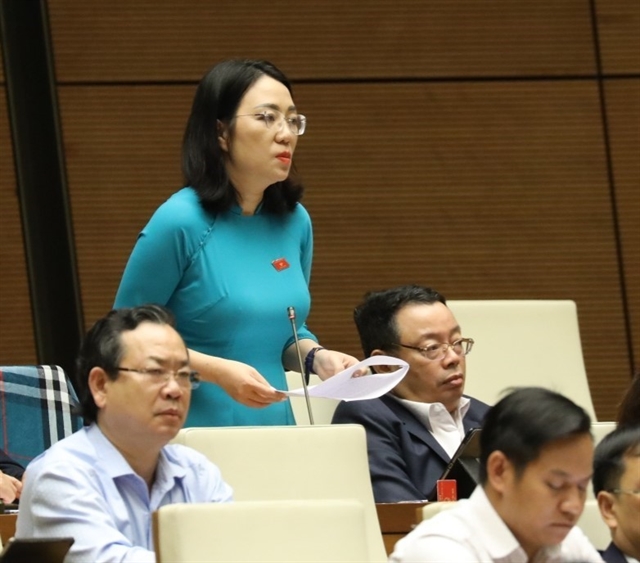 Society
Society


|
| Phạm Thị Minh Hiền, a deputy from Phú Yên Province, at National Assembly's Wednesday plenary session in Hà Nội. — VNA/VNS Photo |
HÀ NỘI — Many National Assembly (NA) deputies raised concerns over the quality of the first-grade textbook set and demanded accountability for the issue in the plenary session on socio-economic issues on Wednesday in Hà Nội.
The debate mostly centred around the Cánh diều (Kite) textbook set led by veteran educationist Nguyễn Minh Thuyết for featuring vernacular that might not be used or recognised nationally, substantial changes to fables used in reading texts and other inappropriate or incorrect contents.
The textbook set was one of several approved for use for the first grade in Việt Nam as this year marks the first time there are multiple options – including privately-written books – for localities and schools to choose from, instead of a single textbook set developed by the education ministry like in previous years.
Phạm Thị Minh Hiền, a deputy from Phú Yên Province, said given this is the first time the textbook selection has been changed while infrastructure and first-grade teachers’ capacity might not up to scratch, hiccups are likely.
Hiền expressed concerns that picking and choosing the best from multiple countries might have resulted in incomplete and “patchy” textbooks.
She expressed displeasure at the “unbelievably lax” review and assessment procedures from the agencies in charge of approval, adding that textbooks cannot be treated as any other type of good.
Hiền hoped that authorities would “look at the facts” and consider delaying the use of textbooks afflicted with issues until completion.
Quách Thế Tản, a deputy from Hoà Bình, acknowledged the achievements of the education sector in 2019-20, especially the switch to online learning during school closures caused by the COVID-19 pandemic earlier this year, and criticised the management of textbooks and reference books.
Tản asked that more efforts should be paid to the assessment of textbooks, and for the time being – coming up with measures to solve the problems found in first-grade textbooks.
Deputy Ngô Thị Minh from Quảng Ninh Province and also deputy education minister said textbook reforms – or education reforms at large that aim to switch to learner-centred approach – are a “major, difficult affair”.
Minh noted the concerns from the public and the deputies are legitimate and the education minister had delivered “strong promises and leadership” regarding this issue.
In his response to the NA, Deputy Prime Minister Vũ Đức Đam said all contributions and feedback regarding the textbooks from lawmakers, scientists, teachers and other members of the public are “cherished” as they showcased the passion and desire to have a good textbook set.
The Government is particularly attentive to the issue, Đam said, adding that the recent cabinet meetings all dedicated some segments to the discussion of textbook issues.
“So far basically, as the National Assembly deputies have said, whichever part has a problem or how serious a problem is must be determined by a professional authority, as deputies and even the education minister have no teaching experience for first-graders after all. But I can say that there certainly are issues contained in the textbooks despite rounds of assessment and reviews prior to the approval and publication,” Đam said.
The Government has asked the education minister and the ministry to pay sufficient attention to the issue and learn from the errors that could have been avoided so similar problems would not afflict the second-grade and sixth-grade textbooks that are being written, he noted.
Other issues discussed on Wednesday included the treatment of wastewater in industrial zones, integrating natural disaster risks into socio-economic planning in the wake of devastation in the central region, increasing the quality and the coverage of forests in the country, sustainable poverty reduction, more focus on vocation training, and support policies for industries and workers hit hardest by the pandemic. — VNS